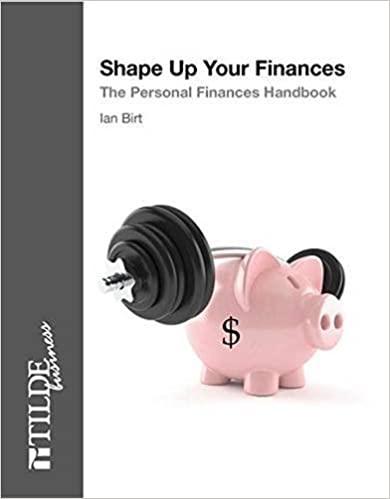Question
Television Broadcasts Limited: Share Repurchase In January 2017, Television Broadcasts Limited (TVB) announced the offer to buy back up to 31.51% of its issued shares
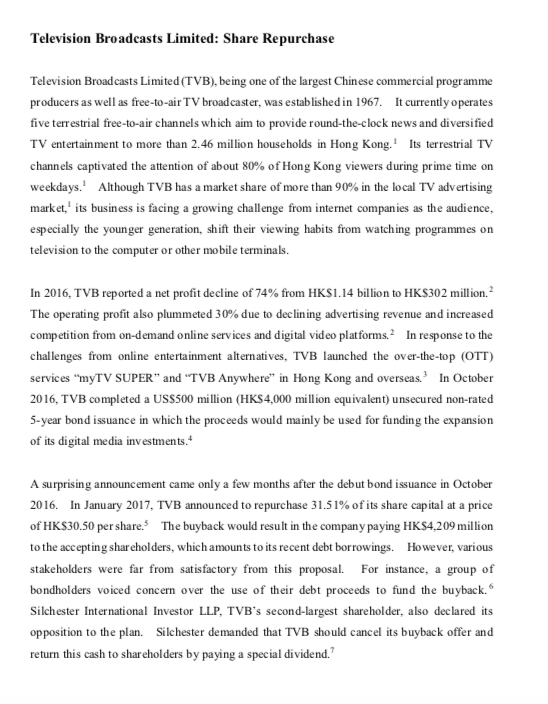
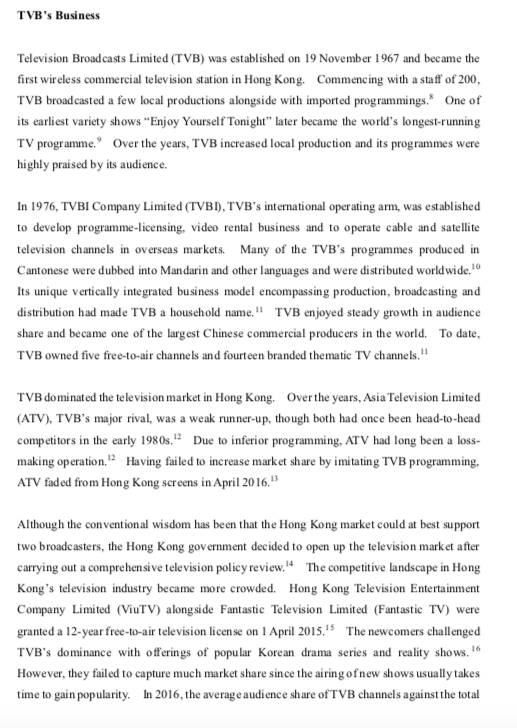
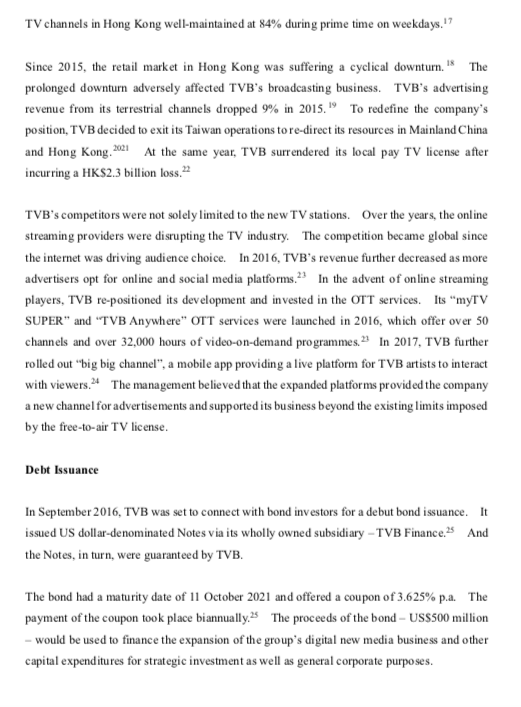
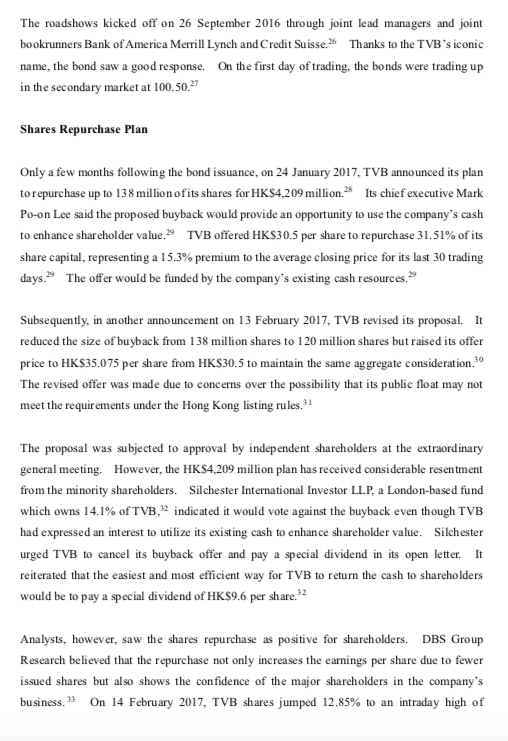
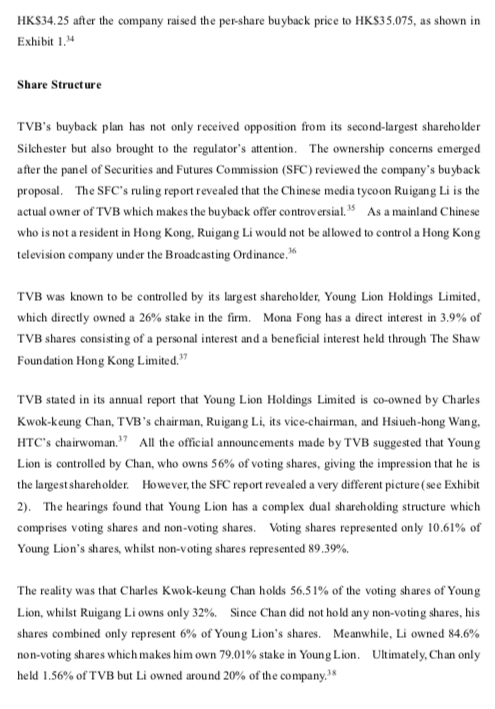
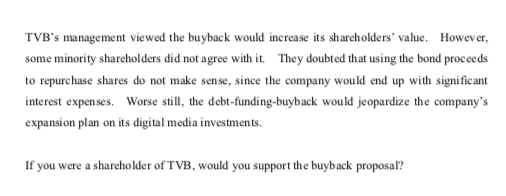
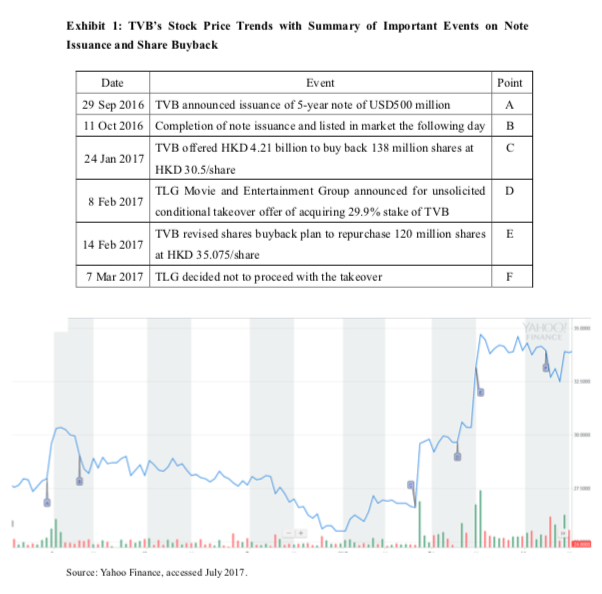
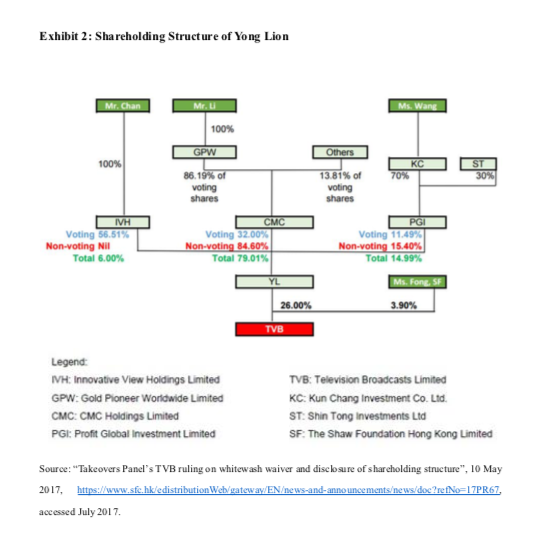
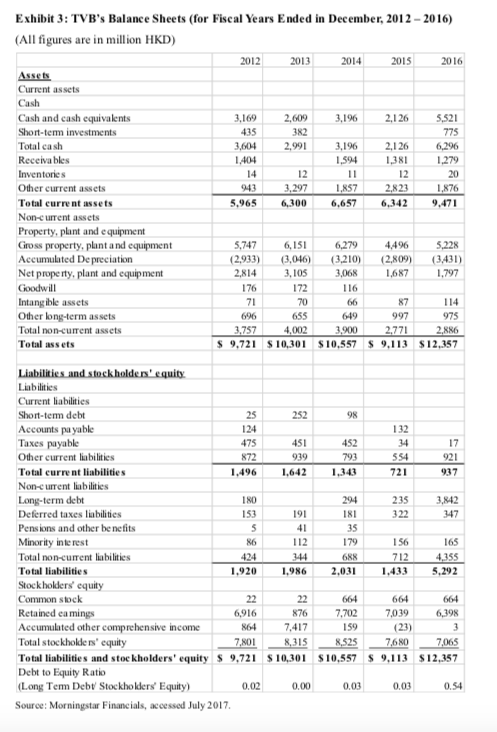
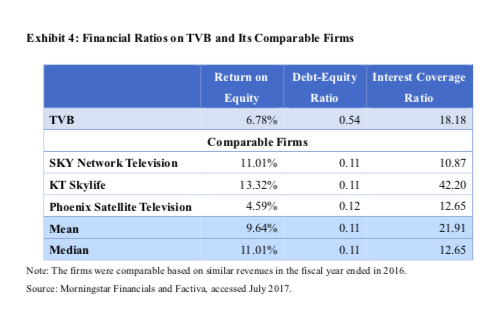
Television Broadcasts Limited: Share Repurchase In January 2017, Television Broadcasts Limited (TVB) announced the offer to buy back up to 31.51% of its issued shares at HK$30.5 per share for a consideration of up to HK$4,209 million. Literally, shareholders view share repurchases as a good thing. In addition to being a vehicle for returning cash to shareholders, they also reduce the total number of outstanding shares, thereby increasing their value for the remaining shareholders. Unfortunately, such buyback plan may not serve the best interests of the investors in this case. Some TVB shareholders doubted that the buyback is carried out with reasons that have nothing to do with maximizing shareholder value. For instance, it may seem counter-intuitive that TVB proposed using a similar sum of money raised from the bond issue in October 2016 to repurchase shares since the debt-funding-buyback would bring about significant interest expenses.
After reading the case, discuss and answer the following questions:
1. What is share repurchase? What are the common approaches by which a listed company can repurchase its own shares?
2. If you were a shareholder of TVB, would you vote for or against the share buyback proposal?
3. From the companys perspective, what is the motive behind the proposed share buyback?
4. Would you support Silchesters proposal of paying a special dividend instead of a share buyback?
Television Broadcasts Limited: Share Repurchase Television Broadcasts Limited (TVB), being one of the largest Chinese commercial programme producers as well as free-to-air TV broadcaster, was established in 1967. It currently operates five terrestrial free-to-air channels which aim to provide round-the-clock news and diversified TV entertainment to more than 2.46 million households in Hong Kong. Its terrestrial TV channels captivated the attention of about 80% of Hong Kong viewers during prime time on weekdays. Although TVB has a market share of more than 90% in the local TV advertising market,' its business is facing a growing challenge from internet companies as the audience, especially the younger generation, shift their viewing habits from watching programmes on television to the computer or other mobile terminals. In 2016, TVB reported a net profit decline of 74% from HK$1.14 billion to HK$302 million.? The operating profit also plummeted 30% due to declining advertising revenue and increased competition from on-demand online services and digital video platforms.? In response to the challenges from online entertainment alternatives, TVB launched the over-the-top (OTT) services "myTV SUPER" and "TVB Anywhere in Hong Kong and overseas. In October 2016, TVB completed a US$500 million (HK$4,000 million equivalent) unsecured non-rated 5-year bond issuance in which the proceeds would mainly be used for funding the expansion of its digital media investments. A surprising announcement came only a few months after the debut bond issuance in October 2016. In January 2017, TVB announced to repurchase 31.51% of its share capital at a price of HK$30.50 per share. The buyback would result in the company paying HK$4,209 million to the accepting shareholders, which amounts to its recent debt borrowings. However, various stakeholders were far from satisfactory from this proposal. For instance, a group of bondholders voiced concern over the use of their debt proceeds to fund the buyback. Silchester International Investor LLP, TVB's second-largest shareholder, also declared its opposition to the plan. Silchester demanded that TVB should cancel its buyback offer and return this cash to shareholders by paying a special dividend. TVB's Business Television Broadcasts Limited (TVB) was established on 19 November 1967 and became the first wireless commercial television station in Hong Kong. Commencing with a staff of 200, TVB broadcasted a few local productions alongside with imported programmings. One of its earliest variety shows "Enjoy Yourself Tonight" later became the world's longest-running TV programme. Over the years, TVB increased local production and its programmes were highly praised by its audience. In 1976, TVBI Company Limited (TVBI), TVB's international operating arm, was established to develop programme-licensing, video rental business and to operate cable and satellite television channels in overseas markets. Many of the TVB's programmes produced in Cantonese were dubbed into Mandarin and other languages and were distributed worldwide. Its unique vertically integrated business model encompassing production, broadcasting and distribution had made TVB a household name." TVB enjoyed steady growth in audience share and became one of the largest Chinese commercial producers in the world. To date, TVB owned five free-to-air channels and fourteen branded thematic TV channels." TVB dominated the television market in Hong Kong. Over the years, Asia Television Limited (ATV), TVB's major rival, was a weak runner-up, though both had once been head-to-head competitors in the early 1980s. Due to inferior programming, ATV had long been a loss- making operation. Having failed to increase market share by imitating TVB programming, ATV faded from Hong Kong screens in April 2016.3 Although the conventional wisdom has been that the Hong Kong market could at best support two broadcasters, the Hong Kong government decided to open up the television market after carrying out a comprehensive television policy review. The competitive landscape in Hong Kong's television industry became more crowded. Hong Kong Television Entertainment Company Limited (ViuTV) alongside Fantastic Television Limited (Fantastic TV) were granted a 12-year free-to-air television license on 1 April 2015. The newcomers challenged TVB's dominance with offerings of popular Korean drama series and reality shows." However, they failed to capture much market share since the airing of new shows usually takes time to gain popularity. In 2016, the average audience share of TVB channels against the total TV channels in Hong Kong well-maintained at 84% during prime time on weekdays.!? Since 2015, the retail market in Hong Kong was suffering a cyclical downturn. The prolonged downturn adversely affected TVB's broadcasting business. TVB's advertising revenue from its terrestrial channels dropped 9% in 2015. To redefine the company's position, TVB decided to exit its Taiwan operations to re-direct its resources in Mainland China and Hong Kong.2021 At the same year, TVB surrendered its local pay TV license after incurring a HK$2.3 billion loss.2 TVB's competitors were not solely limited to the new TV stations. Over the years, the online streaming providers were disrupting the TV industry. The competition became global since the internet was driving audience choice. In 2016, TVB's revenue further decreased as more advertisers opt for online and social media platforms.2) In the advent of online streaming players, TVB re-positioned its development and invested in the OTT services. Its "myrv SUPER" and "TVB Anywhere" OTT services were launched in 2016, which offer over 50 channels and over 32,000 hours of video-on-demand programmes. 2) In 2017, TVB further rolled out big big channel", a mobile app providing a live platform for TVB artists to interact with viewers.24 The management believed that the expanded platforms provided the company a new channel for advertisements and supported its business beyond the existing limits imposed by the free-to-air TV license. Debt Issuance In September 2016, TVB was set to connect with bond investors for a debut bond issuance. It issued US dollar-denominated Notes via its wholly owned subsidiary - TVB Finance.25 And the Notes, in turn, were guaranteed by TVB. The bond had a maturity date of 11 October 2021 and offered a coupon of 3.625% p.a. The payment of the coupon took place biannually.25 The proceeds of the bond - US$500 million - would be used to finance the expansion of the group's digital new media business and other capital expenditures for strategic investment as well as general corporate purposes. The roadshows kicked off on 26 September 2016 through joint lead managers and joint bookrunners Bank of America Merrill Lynch and Credit Suisse. 26 Thanks to the TVB's iconic name, the bond saw a good response. On the first day of trading, the bonds were trading up in the secondary market at 100,50.2% Shares Repurchase Plan Only a few months following the bond issuance, on 24 January 2017, TVB announced its plan to repurchase up to 138 million ofits shares for HKS4,209 million. Its chief executive Mark Po-on Lee said the proposed buyback would provide an opportunity to use the company's cash to enhance shareholder value.29 TVB offered HK$30.5 per share to repurchase 31.51% of its share capital, representing a 15.3% premium to the average closing price for its last 30 trading days. The offer would be funded by the company's existing cash resources.29 Subsequently, in another announcement on 13 February 2017, TVB revised its proposal. It reduced the size of buyback from 138 million shares to 120 million shares but raised its offer price to HK$35.075 per share from HK$30.5 to maintain the same aggregate consideration. The revised offer was made due to concerns over the possibility that its public float may not meet the requirements under the Hong Kong listing rules. The proposal was subjected to approval by independent shareholders at the extraordinary general meeting. However, the HK$4,209 million plan has received considerable resentment from the minority shareholders. Silchester International Investor LLP, a London-based fund which owns 14.1% of TVB,92 indicated it would vote against the buyback even though TVB had expressed an interest to utilize its existing cash to enhance shareholder value. Silchester urged TVB to cancel its buyback offer and pay a special dividend in its open letter. It reiterated that the easiest and most efficient way for TVB to return the cash to shareholders would be to pay a special dividend of HK$9.6 per share." Analysts, however, saw the shares repurchase as positive for shareholders. DBS Group Research believed that the repurchase not only increases the earnings per share due to fewer issued shares but also shows the confidence of the major shareholders in the company's business. 33 On 14 February 2017, TVB shares jumped 12.85% to an intraday high of HK$34.25 after the company raised the per-share buyback price to HK$35.075, as shown in Exhibit 1.4 Share Structure TVB's buyback plan has not only received opposition from its second-largest shareholder Silchester but also brought to the regulator's attention. The ownership concerns emerged after the panel of Securities and Futures Commission (SFC) reviewed the company's buyback proposal. The SFC's ruling report revealed that the Chinese media tycoon Ruigang Li is the actual owner of TVB which makes the buyback offer controversial. As a mainland Chinese who is not a resident in Hong Kong, Ruigang Li would not be allowed to control a Hong Kong television company under the Broadcasting Ordinance. TVB was known to be controlled by its largest shareholder, Young Lion Holdings Limited, which directly owned a 2% stake in the firm. Mona Fong has a direct interest in 3.9% of TVB shares consisting of a personal interest and a beneficial interest held through The Shaw Foundation Hong Kong Limited." TVB stated in its annual report that Young Lion Holdings Limited is co-owned by Charles Kwok-keung Chan, TVB's chairman, Ruigang Li, its vice-chairman, and Hsiuch-hong Wang, HTC's chairwoman." All the official announcements made by TVB suggested that Young Lion is controlled by Chan, who owns 56% of voting shares, giving the impression that he is the largest shareholder. However, the SFC report revealed a very different picture (see Exhibit 2). The hearings found that Young Lion has a complex dual shareholding structure which comprises voting shares and non-voting shares. Voting shares represented only 10.61% of Young Lion's shares, whilst non-voting shares represented 89.39%. The reality was that Charles Kwok-keung Chan holds 56.51% of the voting shares of Young Lion, whilst Ruigang Li owns only 32%. Since Chan did not hold any non-voting shares, his shares combined only represent 6% of Young Lion's shares. Meanwhile, Li owned 84.6% non-voting shares which makes him own 79.01% stake in Young Lion. Ultimately, Chan only held 1.56% of TVB but Li owned around 20% of the company. TVB's management viewed the buyback would increase its shareholders' value. However, some minority shareholders did not agree with it. They doubted that using the bond proceeds to repurchase shares do not make sense, since the company would end up with significant interest expenses. Worse still, the debt-funding-buyback would jeopardize the company's expansion plan on its digital media investments, If you were a shareholder of TVB, would you support the buyback proposal? Exhibit 1: TVB's Stock Price Trends with Summary of Important Events on Note Issuance and Share Buyback Point A B Date Event 29 Sep 2016 TVB announced issuance of 5-year note of USD500 million 11 Oct 2016 Completion of note issuance and listed in market the following day TVB offered HKD 4.21 billion to buy back 138 million shares at 24 Jan 2017 HKD 30.5/share TLG Movie and Entertainment Group announced for unsolicited 8 Feb 2017 conditional takeover offer of acquiring 29.9% stake of TVB TVB revised shares buyback plan to repurchase 120 million shares 14 Feb 2017 at HKD 35.075/share 7 Mar 2017 TLG decided not to proceed with the takeover D E F 2 W mo aum Source: Yahoo Finance, accessed July 2017 Exhibit 2: Shareholding Structure of Yong Lion Mr. Chan Ms. Wang Mr.U 100% GPW 86.19% of voting shares 100% Others 13.81% of voting shares 70% 30% IVH Voting 56.51% Non-voting Ni Total 6.00% CMC Voting 32.00% Non-voting 84.60% Total 79.01% PGI Voting 11.49% Non-voting 15.40% Total 14.99% Ms. Fone. S 3.90% 26.00% TVB Legend IH: Innovative View Holdings Limited GPW: Gold Pioneer worldwide Limited CMC: CMC Holdings Limited PGI: Profit Global Investment Limited TVB: Television Broadcasts Limited KC: Kun Chang Investment Co. Ltd. ST: Shin Tong Investments Ltd SF: The Shaw Foundation Hong Kong Limited 2017. Source: "Takeovers Panel's TVB ruling on whitewash waiver and disclosure of sharcholding structure, 10 May https://www.sfc.hk/edistributionWeb/gateway/ENews-and-announcementsews/doc?refNo=17PR67, accessed July 2017 Exhibit 3: TVB's Balance Sheets (for Fiscal Years Ended in December, 2012 - 2016) (All figures are in million HKD) 2012 2013 2014 2015 2016 Assets Current assets Cash Cash and cash equivalents 3.169 2,609 3,196 2,126 5,521 Short-term investments 435 382 775 Total cash 3,604 2,991 3,196 2.126 6,296 Receivables 1.404 1.594 1,381 1.279 Inventories 14 12 12 20 Other current assets 943 3,297 1.857 2,823 1,876 Total current assets 5,965 6,300 6,657 6,342 9.471 Non-current assets Property, plant and equipment Gross property, plant and equipment 5,747 6,151 6,279 5.228 Accumulated Depreciation (2,933) (3,046) (3,210) (2,809) (3.431) Net property, plant and equipment 3,105 3,068 1.687 1,797 Goodwill 176 172 116 Intangible assets 71 70 66 87 114 Other long-term assets 696 655 649 997 975 Total non-current assets 3.757 4,002 3.900 2.771 2.886 Total assets $ 9,721 $ 10,301 $10,557 $ 9.113 $12,357 2.814 Liabilities and stockholders' equity. Liabilities Current liabilities Short-term debt 25 252 98 Accounts payable 124 132 Taxes payable 475 451 452 34 17 Other current liabilities 872 939 793 554 921 Total current liabilities 1,496 1,642 1,343 721 937 Non-current liabilities Long-term debt 180 294 235 3,842 Deferred taxes liabilities 153 191 181 322 347 Pensions and other benefits 5 41 35 Minority interest 86 112 179 156 165 Total non-current liabilities 424 344 712 4,355 Total liabilities 1,920 1.986 2,031 5,292 Stockholders' equity Common stock 22 22 664 664 Retained ea mings 6,916 876 7,702 7,039 6,398 Accumulated other comprehensive income 864 7.417 159 (23) 3 Total stockholders' equity 7,801 8,315 8,525 7,680 7,065 Total liabilities and stockholders' equity $ 9,721 $ 10,301 $10,557 $ 9,113 $12,357 Debt to Equity Ratio (Long Term Debt Stockholders' Equity) 0.02 0.00 0.03 0.03 0.54 Source: Morningstar Financials, accessed July 2017. 688 Exhibit 4: Financial Ratios on TVB and Its Comparable Firms 0.54 Return on Debt-Equity Interest Coverage Equity Ratio Ratio TVB 6.78% 18.18 Comparable Firms SKY Network Television 11.01% 0.11 10.87 KT Skylife 13.32% 0.11 42.20 Phoenix Satellite Television 4.59% 0.12 12.65 Mean 9.64% 0.11 21.91 Median 11.01% 0.11 12.65 Note: The firms were comparable based on similar revenues in the fiscal year ended in 2016. Source: Morningstar Financials and Factiva, accessed July 2017. Television Broadcasts Limited: Share Repurchase Television Broadcasts Limited (TVB), being one of the largest Chinese commercial programme producers as well as free-to-air TV broadcaster, was established in 1967. It currently operates five terrestrial free-to-air channels which aim to provide round-the-clock news and diversified TV entertainment to more than 2.46 million households in Hong Kong. Its terrestrial TV channels captivated the attention of about 80% of Hong Kong viewers during prime time on weekdays. Although TVB has a market share of more than 90% in the local TV advertising market,' its business is facing a growing challenge from internet companies as the audience, especially the younger generation, shift their viewing habits from watching programmes on television to the computer or other mobile terminals. In 2016, TVB reported a net profit decline of 74% from HK$1.14 billion to HK$302 million.? The operating profit also plummeted 30% due to declining advertising revenue and increased competition from on-demand online services and digital video platforms.? In response to the challenges from online entertainment alternatives, TVB launched the over-the-top (OTT) services "myTV SUPER" and "TVB Anywhere in Hong Kong and overseas. In October 2016, TVB completed a US$500 million (HK$4,000 million equivalent) unsecured non-rated 5-year bond issuance in which the proceeds would mainly be used for funding the expansion of its digital media investments. A surprising announcement came only a few months after the debut bond issuance in October 2016. In January 2017, TVB announced to repurchase 31.51% of its share capital at a price of HK$30.50 per share. The buyback would result in the company paying HK$4,209 million to the accepting shareholders, which amounts to its recent debt borrowings. However, various stakeholders were far from satisfactory from this proposal. For instance, a group of bondholders voiced concern over the use of their debt proceeds to fund the buyback. Silchester International Investor LLP, TVB's second-largest shareholder, also declared its opposition to the plan. Silchester demanded that TVB should cancel its buyback offer and return this cash to shareholders by paying a special dividend. TVB's Business Television Broadcasts Limited (TVB) was established on 19 November 1967 and became the first wireless commercial television station in Hong Kong. Commencing with a staff of 200, TVB broadcasted a few local productions alongside with imported programmings. One of its earliest variety shows "Enjoy Yourself Tonight" later became the world's longest-running TV programme. Over the years, TVB increased local production and its programmes were highly praised by its audience. In 1976, TVBI Company Limited (TVBI), TVB's international operating arm, was established to develop programme-licensing, video rental business and to operate cable and satellite television channels in overseas markets. Many of the TVB's programmes produced in Cantonese were dubbed into Mandarin and other languages and were distributed worldwide. Its unique vertically integrated business model encompassing production, broadcasting and distribution had made TVB a household name." TVB enjoyed steady growth in audience share and became one of the largest Chinese commercial producers in the world. To date, TVB owned five free-to-air channels and fourteen branded thematic TV channels." TVB dominated the television market in Hong Kong. Over the years, Asia Television Limited (ATV), TVB's major rival, was a weak runner-up, though both had once been head-to-head competitors in the early 1980s. Due to inferior programming, ATV had long been a loss- making operation. Having failed to increase market share by imitating TVB programming, ATV faded from Hong Kong screens in April 2016.3 Although the conventional wisdom has been that the Hong Kong market could at best support two broadcasters, the Hong Kong government decided to open up the television market after carrying out a comprehensive television policy review. The competitive landscape in Hong Kong's television industry became more crowded. Hong Kong Television Entertainment Company Limited (ViuTV) alongside Fantastic Television Limited (Fantastic TV) were granted a 12-year free-to-air television license on 1 April 2015. The newcomers challenged TVB's dominance with offerings of popular Korean drama series and reality shows." However, they failed to capture much market share since the airing of new shows usually takes time to gain popularity. In 2016, the average audience share of TVB channels against the total TV channels in Hong Kong well-maintained at 84% during prime time on weekdays.!? Since 2015, the retail market in Hong Kong was suffering a cyclical downturn. The prolonged downturn adversely affected TVB's broadcasting business. TVB's advertising revenue from its terrestrial channels dropped 9% in 2015. To redefine the company's position, TVB decided to exit its Taiwan operations to re-direct its resources in Mainland China and Hong Kong.2021 At the same year, TVB surrendered its local pay TV license after incurring a HK$2.3 billion loss.2 TVB's competitors were not solely limited to the new TV stations. Over the years, the online streaming providers were disrupting the TV industry. The competition became global since the internet was driving audience choice. In 2016, TVB's revenue further decreased as more advertisers opt for online and social media platforms.2) In the advent of online streaming players, TVB re-positioned its development and invested in the OTT services. Its "myrv SUPER" and "TVB Anywhere" OTT services were launched in 2016, which offer over 50 channels and over 32,000 hours of video-on-demand programmes. 2) In 2017, TVB further rolled out big big channel", a mobile app providing a live platform for TVB artists to interact with viewers.24 The management believed that the expanded platforms provided the company a new channel for advertisements and supported its business beyond the existing limits imposed by the free-to-air TV license. Debt Issuance In September 2016, TVB was set to connect with bond investors for a debut bond issuance. It issued US dollar-denominated Notes via its wholly owned subsidiary - TVB Finance.25 And the Notes, in turn, were guaranteed by TVB. The bond had a maturity date of 11 October 2021 and offered a coupon of 3.625% p.a. The payment of the coupon took place biannually.25 The proceeds of the bond - US$500 million - would be used to finance the expansion of the group's digital new media business and other capital expenditures for strategic investment as well as general corporate purposes. The roadshows kicked off on 26 September 2016 through joint lead managers and joint bookrunners Bank of America Merrill Lynch and Credit Suisse. 26 Thanks to the TVB's iconic name, the bond saw a good response. On the first day of trading, the bonds were trading up in the secondary market at 100,50.2% Shares Repurchase Plan Only a few months following the bond issuance, on 24 January 2017, TVB announced its plan to repurchase up to 138 million ofits shares for HKS4,209 million. Its chief executive Mark Po-on Lee said the proposed buyback would provide an opportunity to use the company's cash to enhance shareholder value.29 TVB offered HK$30.5 per share to repurchase 31.51% of its share capital, representing a 15.3% premium to the average closing price for its last 30 trading days. The offer would be funded by the company's existing cash resources.29 Subsequently, in another announcement on 13 February 2017, TVB revised its proposal. It reduced the size of buyback from 138 million shares to 120 million shares but raised its offer price to HK$35.075 per share from HK$30.5 to maintain the same aggregate consideration. The revised offer was made due to concerns over the possibility that its public float may not meet the requirements under the Hong Kong listing rules. The proposal was subjected to approval by independent shareholders at the extraordinary general meeting. However, the HK$4,209 million plan has received considerable resentment from the minority shareholders. Silchester International Investor LLP, a London-based fund which owns 14.1% of TVB,92 indicated it would vote against the buyback even though TVB had expressed an interest to utilize its existing cash to enhance shareholder value. Silchester urged TVB to cancel its buyback offer and pay a special dividend in its open letter. It reiterated that the easiest and most efficient way for TVB to return the cash to shareholders would be to pay a special dividend of HK$9.6 per share." Analysts, however, saw the shares repurchase as positive for shareholders. DBS Group Research believed that the repurchase not only increases the earnings per share due to fewer issued shares but also shows the confidence of the major shareholders in the company's business. 33 On 14 February 2017, TVB shares jumped 12.85% to an intraday high of HK$34.25 after the company raised the per-share buyback price to HK$35.075, as shown in Exhibit 1.4 Share Structure TVB's buyback plan has not only received opposition from its second-largest shareholder Silchester but also brought to the regulator's attention. The ownership concerns emerged after the panel of Securities and Futures Commission (SFC) reviewed the company's buyback proposal. The SFC's ruling report revealed that the Chinese media tycoon Ruigang Li is the actual owner of TVB which makes the buyback offer controversial. As a mainland Chinese who is not a resident in Hong Kong, Ruigang Li would not be allowed to control a Hong Kong television company under the Broadcasting Ordinance. TVB was known to be controlled by its largest shareholder, Young Lion Holdings Limited, which directly owned a 2% stake in the firm. Mona Fong has a direct interest in 3.9% of TVB shares consisting of a personal interest and a beneficial interest held through The Shaw Foundation Hong Kong Limited." TVB stated in its annual report that Young Lion Holdings Limited is co-owned by Charles Kwok-keung Chan, TVB's chairman, Ruigang Li, its vice-chairman, and Hsiuch-hong Wang, HTC's chairwoman." All the official announcements made by TVB suggested that Young Lion is controlled by Chan, who owns 56% of voting shares, giving the impression that he is the largest shareholder. However, the SFC report revealed a very different picture (see Exhibit 2). The hearings found that Young Lion has a complex dual shareholding structure which comprises voting shares and non-voting shares. Voting shares represented only 10.61% of Young Lion's shares, whilst non-voting shares represented 89.39%. The reality was that Charles Kwok-keung Chan holds 56.51% of the voting shares of Young Lion, whilst Ruigang Li owns only 32%. Since Chan did not hold any non-voting shares, his shares combined only represent 6% of Young Lion's shares. Meanwhile, Li owned 84.6% non-voting shares which makes him own 79.01% stake in Young Lion. Ultimately, Chan only held 1.56% of TVB but Li owned around 20% of the company. TVB's management viewed the buyback would increase its shareholders' value. However, some minority shareholders did not agree with it. They doubted that using the bond proceeds to repurchase shares do not make sense, since the company would end up with significant interest expenses. Worse still, the debt-funding-buyback would jeopardize the company's expansion plan on its digital media investments, If you were a shareholder of TVB, would you support the buyback proposal? Exhibit 1: TVB's Stock Price Trends with Summary of Important Events on Note Issuance and Share Buyback Point A B Date Event 29 Sep 2016 TVB announced issuance of 5-year note of USD500 million 11 Oct 2016 Completion of note issuance and listed in market the following day TVB offered HKD 4.21 billion to buy back 138 million shares at 24 Jan 2017 HKD 30.5/share TLG Movie and Entertainment Group announced for unsolicited 8 Feb 2017 conditional takeover offer of acquiring 29.9% stake of TVB TVB revised shares buyback plan to repurchase 120 million shares 14 Feb 2017 at HKD 35.075/share 7 Mar 2017 TLG decided not to proceed with the takeover D E F 2 W mo aum Source: Yahoo Finance, accessed July 2017 Exhibit 2: Shareholding Structure of Yong Lion Mr. Chan Ms. Wang Mr.U 100% GPW 86.19% of voting shares 100% Others 13.81% of voting shares 70% 30% IVH Voting 56.51% Non-voting Ni Total 6.00% CMC Voting 32.00% Non-voting 84.60% Total 79.01% PGI Voting 11.49% Non-voting 15.40% Total 14.99% Ms. Fone. S 3.90% 26.00% TVB Legend IH: Innovative View Holdings Limited GPW: Gold Pioneer worldwide Limited CMC: CMC Holdings Limited PGI: Profit Global Investment Limited TVB: Television Broadcasts Limited KC: Kun Chang Investment Co. Ltd. ST: Shin Tong Investments Ltd SF: The Shaw Foundation Hong Kong Limited 2017. Source: "Takeovers Panel's TVB ruling on whitewash waiver and disclosure of sharcholding structure, 10 May https://www.sfc.hk/edistributionWeb/gateway/ENews-and-announcementsews/doc?refNo=17PR67, accessed July 2017 Exhibit 3: TVB's Balance Sheets (for Fiscal Years Ended in December, 2012 - 2016) (All figures are in million HKD) 2012 2013 2014 2015 2016 Assets Current assets Cash Cash and cash equivalents 3.169 2,609 3,196 2,126 5,521 Short-term investments 435 382 775 Total cash 3,604 2,991 3,196 2.126 6,296 Receivables 1.404 1.594 1,381 1.279 Inventories 14 12 12 20 Other current assets 943 3,297 1.857 2,823 1,876 Total current assets 5,965 6,300 6,657 6,342 9.471 Non-current assets Property, plant and equipment Gross property, plant and equipment 5,747 6,151 6,279 5.228 Accumulated Depreciation (2,933) (3,046) (3,210) (2,809) (3.431) Net property, plant and equipment 3,105 3,068 1.687 1,797 Goodwill 176 172 116 Intangible assets 71 70 66 87 114 Other long-term assets 696 655 649 997 975 Total non-current assets 3.757 4,002 3.900 2.771 2.886 Total assets $ 9,721 $ 10,301 $10,557 $ 9.113 $12,357 2.814 Liabilities and stockholders' equity. Liabilities Current liabilities Short-term debt 25 252 98 Accounts payable 124 132 Taxes payable 475 451 452 34 17 Other current liabilities 872 939 793 554 921 Total current liabilities 1,496 1,642 1,343 721 937 Non-current liabilities Long-term debt 180 294 235 3,842 Deferred taxes liabilities 153 191 181 322 347 Pensions and other benefits 5 41 35 Minority interest 86 112 179 156 165 Total non-current liabilities 424 344 712 4,355 Total liabilities 1,920 1.986 2,031 5,292 Stockholders' equity Common stock 22 22 664 664 Retained ea mings 6,916 876 7,702 7,039 6,398 Accumulated other comprehensive income 864 7.417 159 (23) 3 Total stockholders' equity 7,801 8,315 8,525 7,680 7,065 Total liabilities and stockholders' equity $ 9,721 $ 10,301 $10,557 $ 9,113 $12,357 Debt to Equity Ratio (Long Term Debt Stockholders' Equity) 0.02 0.00 0.03 0.03 0.54 Source: Morningstar Financials, accessed July 2017. 688 Exhibit 4: Financial Ratios on TVB and Its Comparable Firms 0.54 Return on Debt-Equity Interest Coverage Equity Ratio Ratio TVB 6.78% 18.18 Comparable Firms SKY Network Television 11.01% 0.11 10.87 KT Skylife 13.32% 0.11 42.20 Phoenix Satellite Television 4.59% 0.12 12.65 Mean 9.64% 0.11 21.91 Median 11.01% 0.11 12.65 Note: The firms were comparable based on similar revenues in the fiscal year ended in 2016. Source: Morningstar Financials and Factiva, accessed July 2017Step by Step Solution
There are 3 Steps involved in it
Step: 1

Get Instant Access to Expert-Tailored Solutions
See step-by-step solutions with expert insights and AI powered tools for academic success
Step: 2

Step: 3

Ace Your Homework with AI
Get the answers you need in no time with our AI-driven, step-by-step assistance
Get Started


